First Interchangeable Biosimilar Insulin Approved
Semglee (insulin glargine-yfgn) is a biosimilar basal insulin with the same chemical composition as insulin glargine. However, since it is a biosimilar, it is a less costly version of this widely popular basal insulin. Up until now, pharmacists could not make “pharmacy-level substitution”—much like how generic drugs are substituted for brand name drugs, without provider approval.
With this new FDA approval, an interchangeable biosimilar product may be substituted for the reference product without the intervention of the prescriber. Biosimilars marketed in the U.S. typically have launched with initial list prices 15% to 35% lower than comparative list prices of the reference products.
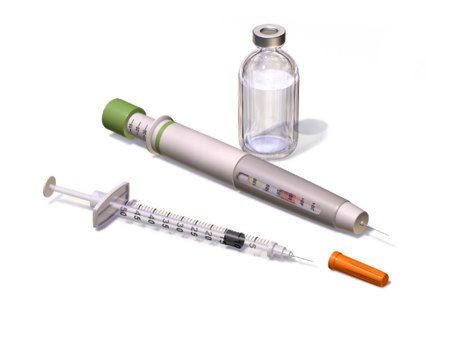
Bottom line, the pharmacist can now interchange or substituted semglee for its reference product Lantus (insulin glargine) without prescriber approval.
“This is a momentous day for people who rely daily on insulin for treatment of diabetes, as biosimilar and interchangeable biosimilar products have the potential to greatly reduce health care costs,” said Acting FDA Commissioner Janet Woodcock, M.D.
This also has implications for future, lower cost biosimilars says Dr. Woodcock. “Today’s approval of the first interchangeable biosimilar product furthers FDA’s longstanding commitment to support a competitive marketplace for biological products and ultimately empowers patients by helping to increase access to safe, effective and high-quality medications at potentially lower cost.”
Semglee (insulin glargine-yfgn), offered in 10 mL vials and 3 mL prefilled pens, is administered subcutaneously once daily.
Access to affordable insulin is critical and the approval of this first biosimilar heralds good news for future biosimilar interchangeability.
Rationale of the Week | How do Pregnancy Hormones affect Glucose?

For our June 22nd Question of the Week, 64% of respondents chose the best answer. Since many diabetes specialists aren’t exposed to the care of people with diabetes during pregnancy, we want to “take a closer look” at this question and determine strategies to choose the best response so test takers can be ready for these types of questions.
Before we start though, if you don’t want any spoilers and haven’t tried the question yet, you can answer below: Answer Question
Question: ML has type 1 diabetes, her A1c is on target and she and is hoping to get pregnant in the upcoming year.
Which of the following statement best reflects the physiologic changes associated with pregnancy?
Answer Choices:
- A sharp increase in glucose levels in the first trimester due to placental hormones.
- A decrease in insulin needs during the second and third trimester.
- A minimal fluctuation in insulin needs until about 36 weeks.
- A decrease in insulin needs during the first 16 weeks.
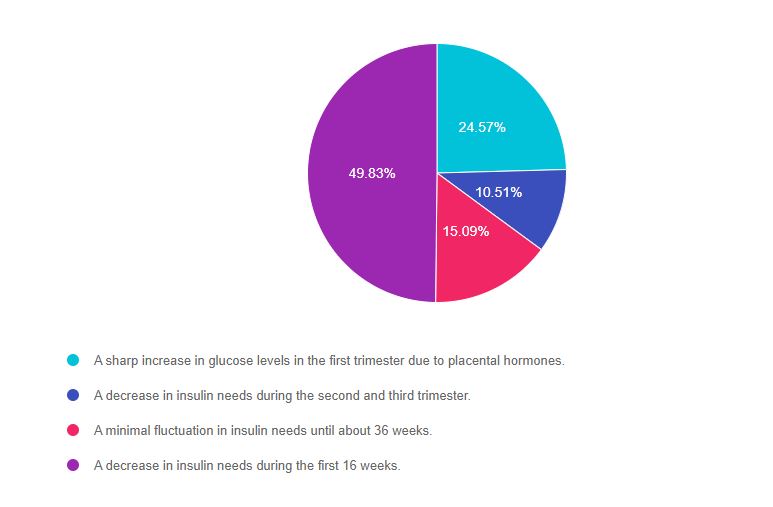
As shown above, the most common choice was option 4, the second most common answer was option 1, then option 3, and finally option 2.
Getting to the Best Answer
If you are thinking about taking the certification exam, the content of this practice test question will set you up for success. The exam will present questions that require test takers to be familiar with knowledge of diabetes during pregnancy,
Answers & Rationale
Answer 1 is incorrect, 24.57% chose this answer, “A sharp increase in glucose levels in the first trimester due to placental hormones.” This is not the best answer based on the pathophysiology of early pregnancy. According to ADA Standards of Care 14, “early pregnancy is a time of enhanced insulin sensitivity and lower glucose levels, many women with type 1 diabetes will have lower insulin requirements and increased risk for hypoglycemia.” Often, during the first trimester, insulin doses may need to be decreased to prevent hypoglycemia.
Answer 2 is incorrect, 10.51% of you chose this answer, “A decrease in insulin needs during the second and third trimester.” This is not the best answer based on the pathophysiology of mid and later pregnancy. According to ADA Standards of Care 14, “Around 16 weeks, insulin resistance begins to increase, and total daily insulin doses increase linearly ?5% per week through week 36. This usually results in a doubling of daily insulin dose compared with the prepregnancy requirement.”
Answer 3 is incorrect, 15.09% of you chose this answer, “A minimal fluctuation in insulin needs until about 36 weeks.” This is not the best answer based on the pathophysiology of pregnancy. Based on answers 1 and 2, blood sugars can plummet during early pregnancy and then glucose levels dramatically increase starting at 16 weeks, resulting in increasing insulin requirement of about 5% a week through week 36 of pregnancy.
Answer 4 is correct, 49.83% of you chose this answer “A decrease in insulin needs during the first 16 weeks.” GREAT JOB – Since there is increased glucose uptake by the fetus and placenta combined with enhanced insulin sensitivity in early pregnancy, blood sugars generally run lower and are associated with lower insulin requirements during the first 16 weeks.
We hope you appreciate this week’s rationale! Thank you so much for taking the time to answer our Question of the Week and participate in this fun learning activity!
Want to learn more about this topic? Enroll in our
Level 2 | Pregnancy & Diabetes Standards | 1.5 CEs

People living with diabetes who are pregnant are confronted with a variety of issues that require special attention, education, and understanding.
This course reviews those special needs while focusing on Gestational Diabetes and Pre-Existing Diabetes. Included are the most recent diagnostic criteria, management goals, and prevention of complications during pregnancy. A helpful review for the CDCES Exam and for those who want more information on people who are pregnant and live with Diabetes.
Topics include:
- Three issues that affect pregnancy with diabetes
- The unique attributes of pre-existing diabetes in pregnancy and gestational diabetes
- Diagnostic criteria and management goals for gestational diabetes
- Potential short term and long term complications of fetal exposure to hypoglycemia
- Prevention measures to keep mother and baby healthy
See Full Calendar for upcoming webinars and Virtual Courses.
Can’t make it live? All paid registrants are guaranteed access to the video presentation, handouts and podcasts.
Sign up for Diabetes Blog Bytes – we post one daily Blog Byte from Monday to Friday. And of course, Tuesday is our Question of the Week. It’s Informative and FREE! Sign up below!
[yikes-mailchimp form=”1″]Accreditation: Diabetes Education Services is an approved provider by the California Board of Registered Nursing, Provider 12640, and Commission on Dietetic Registration (CDR), Provider DI002. Since these programs are approved by the CDR it satisfies the CE requirements for the CDCES regardless of your profession.*
The use of DES products does not guarantee the successful passage of the CDCES exam. CBDCE does not endorse any preparatory or review materials for the CDCES exam, except for those published by CBDCE.
Question of the Week | Prepping for Surgery

AR is living with type 2 diabetes, has an A1c of 7.4%, and takes metformin 1000 BID and 60 units of glargine at bedtime. AR is admitted to the hospital overnight for early morning surgery.
According to ADA Guidelines, what adjustment in his diabetes medications are needed to prepare for a safe surgery?
- Hold the evening metformin and glargine the night before surgery to prevent perioperative hypoglycemia.
- Hold morning metformin the day of surgery and give about 40 units of bedtime glargine the night before surgery.
- Hold metformin 3 days before surgery and give 60 units of bedtime glargine the night before surgery.
- Hold the metformin the day before surgery and give the glargine the morning of surgery to prevent perioperative hyperglycemia.
Click here to test your knowledge!
Want to learn more about this topic? Enroll in our
Level 2 | Hospitals & Hyperglycemia Standards | 1.5 CEs

Research clearly demonstrates the importance of glucose control during hospitalization to improve outcomes not only in the inpatient setting but after discharge. This course reviews the evidence that supports inpatient glucose control and outline practical strategies to achieve targets in the inpatient setting. We incorporate the latest ADA Standards and provide links to resources and inpatient management templates.
Topics include:
- The impact of hyperglycemia in the hospital setting.
- The importance of inpatient glucose control.
- Three strategies to get glucose to goal in the hospital setting.
See Full Calendar for upcoming webinars and Virtual Courses.
Can’t make it live? All paid registrants are guaranteed access to the video presentation, handouts and podcasts.
Sign up for Diabetes Blog Bytes – we post one daily Blog Byte from Monday to Friday. And of course, Tuesday is our Question of the Week. It’s Informative and FREE! Sign up below!
[yikes-mailchimp form=”1″]Accreditation: Diabetes Education Services is an approved provider by the California Board of Registered Nursing, Provider 12640, and Commission on Dietetic Registration (CDR), Provider DI002. Since these programs are approved by the CDR it satisfies the CE requirements for the CDCES regardless of your profession.*
The use of DES products does not guarantee the successful passage of the CDCES exam. CBDCE does not endorse any preparatory or review materials for the CDCES exam, except for those published by CBDCE.
Question of the Week | How do Pregnancy Hormones affect Glucose?

ML has type 1 diabetes, her A1c is on target and she and is hoping to get pregnant in the upcoming year.
Which of the following statement best reflects the physiologic changes associated with pregnancy?
- A sharp increase in glucose levels in the first trimester due to placental hormones.
- A decrease in insulin needs during the second and third trimester.
- A minimal fluctuation in insulin needs until about 36 weeks.
- A decrease in insulin needs during the first 16 weeks.
Click here to test your knowledge!
Want to learn more about this topic? Enroll in our
Level 2 | Pregnancy & Diabetes Standards | 1.5 CEs

People living with diabetes who are pregnant are confronted with a variety of issues that require special attention, education, and understanding.
This course reviews those special needs while focusing on Gestational Diabetes and Pre-Existing Diabetes. Included are the most recent diagnostic criteria, management goals, and prevention of complications during pregnancy. A helpful review for the CDCES Exam and for those who want more information on people who are pregnant and live with Diabetes.
Topics include:
- Three issues that affect pregnancy with diabetes
- The unique attributes of pre-existing diabetes in pregnancy and gestational diabetes
- Diagnostic criteria and management goals for gestational diabetes
- Potential short term and long term complications of fetal exposure to hypoglycemia
- Prevention measures to keep mother and baby healthy
See Full Calendar for upcoming webinars and Virtual Courses.
Can’t make it live? All paid registrants are guaranteed access to the video presentation, handouts and podcasts.
Sign up for Diabetes Blog Bytes – we post one daily Blog Byte from Monday to Friday. And of course, Tuesday is our Question of the Week. It’s Informative and FREE! Sign up below!
[yikes-mailchimp form=”1″]Accreditation: Diabetes Education Services is an approved provider by the California Board of Registered Nursing, Provider 12640, and Commission on Dietetic Registration (CDR), Provider DI002. Since these programs are approved by the CDR it satisfies the CE requirements for the CDCES regardless of your profession.*
The use of DES products does not guarantee the successful passage of the CDCES exam. CBDCE does not endorse any preparatory or review materials for the CDCES exam, except for those published by CBDCE.
Rationale of the Week | JR worried about cancer; sorting fact from fiction

For our June 8th Question of the Week, only 64% of respondents chose the best answer. We want to “take a closer look” at this question and determine strategies to choose the best response.
Before we start though, if you don’t want any spoilers and haven’t tried the question yet, you can answer below: Answer Question
Question: JR is taking Metformin 1000mg BID but is worried about getting cancer and is thinking about stopping the metformin.
Which of the following is an accurate statement regarding diabetes and cancer?
Answer Choices:
- People with diabetes have a slightly lower risk of liver and uterine cancers.
- Some brands of metformin were recalled because of an NDMA impurity, so it is best to hold metformin for now.
- There is research suggesting that metformin may be associated with a decreased risk of certain cancers.
- Metformin does not increase the risk of cancer, but it can negatively impact renal function.
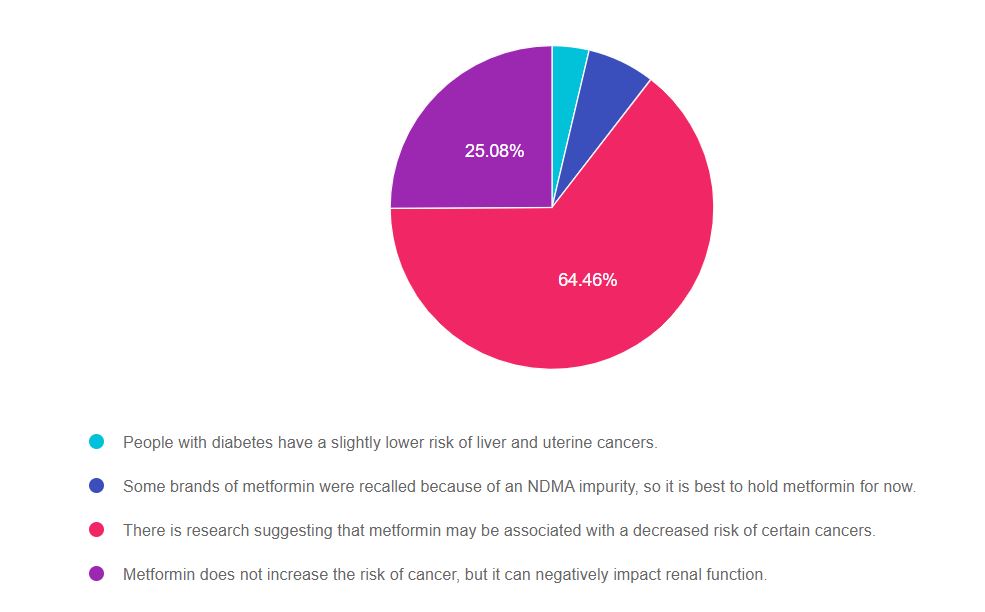
As shown above, the most common choice was option 3, the second most common answer was option 4, then option 2, and finally option 1.
Getting to the Best Answer
If you are thinking about taking the certification exam, the content of this practice test question will set you up for success. The exam will present questions that require test takers to be familiar with knowledge of diabetes co-conditions plus prevention and screening guidelines.
Answers & Rationale
Answer 1 is incorrect, 3.69% chose this answer, “People with diabetes have a slightly lower risk of liver and uterine cancers.” People with type 2 diabetes have a higher risk of getting liver and endometrial cancers. There is an increased risk of diabetes and cancer in the same person due to an overlap of risk factors (age and weight) plus lifestyle factors (smoking, activity level, income and environmental factors).
Answer 2 is incorrect, 6.77% of you chose this answer, “Some brands of metformin were recalled because of an NDMA impurity, so it is best to hold metformin for now.” In 2020, some brands of Metformin were recalled because of above acceptable levels of NDMA due to the manufacturing process. The FDA recalled those brands and they were pulled from pharmacy shelves. Any dispensed metformin post recall should be safe.
Answer 3 is Correct, 64.46% of you chose this answer, “There is research suggesting that metformin may be associated with a decreased risk of certain cancers.” YES, you chose the BEST answer. Congratulations. Multiple studies have examined metformin for its potential tumor and cancer fighting ability and it looks very promising. Read more here >>
Answer 4 is incorrect, 25.08% of you chose this answer, “Metformin does not increase the risk of cancer, but it can negatively impact renal function.” This answer is NOT correct. Metformin appears to reduce the risk of some cancers but does NOT harm kidney function. There has been a increase of misinformation about metformin over the past year. Metformin is not recommended for anyone with a GFR less than 30 due to increase risk of lactic acidosis. But, metformin WON’T harm the kidneys and one could even argue that it protects them by lowering A1C by 1-2% points. You can download our Medication PocketCards for more information.
We hope you appreciate this week’s rationale! Thank you so much for taking the time to answer our Question of the Week and participate in this fun learning activity!
Level 4 | Cancer & Diabetes | 1.25 CEs
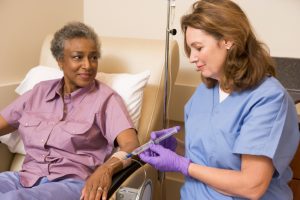
Patients with cancer often experience hyperglycemia secondary to treatment, which can increase risk of infection and compromise their nutritional status. In addition, recent research has identified the link between diabetes and cancer. Join us to learn more about this unexpected link and treatment strategies for steroid induced hyperglycemia using a case study approach.
Topics Include:
- Discuss the relationship between cancer, hyperglycemia and insulin resistance.
- State 3 benefits of normalizing glucose levels during chemotherapy.
- Using a case study approach, discuss strategies to improve glucose levels and quality of life.
2021 Live Webinar Events
See Full Calendar for upcoming webinars and Virtual Courses.
Can’t make it live? All paid registrants are guaranteed access to the video presentation, handouts and podcasts.
Sign up for Diabetes Blog Bytes – we post one daily Blog Byte from Monday to Friday. And of course, Tuesday is our Question of the Week. It’s Informative and FREE! Sign up below!
[yikes-mailchimp form=”1″]Accreditation: Diabetes Education Services is an approved provider by the California Board of Registered Nursing, Provider 12640, and Commission on Dietetic Registration (CDR), Provider DI002. Since these programs are approved by the CDR it satisfies the CE requirements for the CDCES regardless of your profession.
The use of DES products does not guarantee the successful passage of the CDCES exam. CBDCE does not endorse any preparatory or review materials for the CDCES exam, except for those published by CBDCE.
A1c may not accurately Diagnose Diabetes in People of African Descent
Written by Monique Jackson, MSN, CFNP, WHCNP, CDCES
A new study finds that hemoglobinopathies may distort A1C accuracy for people of African descent living with diabetes.
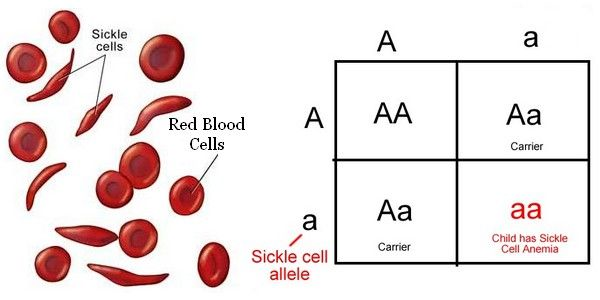
African Americans at risk for falsely low A1cs due to Hemoglobin Variants
Hemoglobin variants don’t increase the risk for diabetes, but it can affect the results of A1C tests. African Americans Heterozygous for the common hemoglobin variant HbS may have, for any given level of mean glycemia, lower A1C by about 0.3% then those without the trait. Another genetic variant, X-linked glucose-6-phosphate dehydrogenase G202A, carried by 11% of African Americans, was associated with a decrease in A1C of about 0.8% in homozygous men and 0.7% in homozygous women compared with those without the variant (American Diabetes Association, Standards of Care in Diabetes-2021; 16).
Health care professionals often use A1C test results to guide decisions about diabetes care, such as changes to medication, meal plan, or physical activity routine to manage diabetes. In those with certain hemoglobin variants, A1C is not accurate for diagnosing and managing diabetes. Different tests that accurately reflect long term glucose levels are needed for early diagnosis and to provide needed medical management that prevents complications.
Mismatch between Glucose and A1c – My Clinical Finding
At my clinic, where I work as a Diabetes Nurse Specialist, an African American individual arrived with a high random glucose and mildly abnormal A1C. Reviewing their lab work, I noticed that the random blood glucose was 300 mg/dl and the A1C was at approximately 7.0%. When I converted the A1C to average blood glucose and compared with the elevated reading in the logs, the numbers did not match up. I realized that this individual had one of the hemoglobin variants (Sickle Cell anemia) HbS. I ended up starting them on Metformin for blood sugar, Atorvastatin because of the guidelines that everyone with Diabetes should be on a statin, Aspirin to prevent heart attack, and Lisinopril for blood pressure control.
Without this clinical finding that the elevated blood sugars were not reflected in the A1c, this individual might not have been started on diabetes treatment, because of the false low A1C.
A1C reflects glucose concentration from the past 2-3 months, but this relationship may differ between those with nutritional deficiencies, anemia, or genetic hemoglobinopathies, including the Sickle cell trait.
Since A1C measures the percentage of glycosylated hemoglobin, individuals who possess variants of hemoglobin can exhibit falsely low readings.
Fructosamine testing, which evaluates albumin glycosylation for the past 2-3 weeks, may be a better measure to help people with diabetes monitor and manage their blood glucose levels in cases where the A1C test cannot be used and/or a short-term monitoring window is desired.
Summary and Notes for the Future
It is important to consider the results of the A1C, fasting blood glucose, two-hour glucose tolerance test, random blood glucose, and or fructosamine when you are screening someone with diabetes who is diagnosed with a Hemoglobin variant.
A1C testing on two different occasions to diagnose diabetes for those with Hbs variants is not recommended, because it will yield false low results. To diagnose a person with diabetes and Hbs variants, the ADA recommends only plasma blood glucose criteria be used to diagnose diabetes.
More research is needed on the diagnoses of diabetes utilizing the A1C in populations with increased prevalence of Hbs variants. In addition, we need research aimed toward providing more accurate tests for the diagnosis and management of conditions associated with increased red blood cells turnover, such as sickle cell disease, hemoglobinopathy variants, pregnancy (second and third trimester).
Welcome, Monique Jackson, MSN, CFNP, WHCNP, CDCES, our new Blog Content Writer!
We are so excited to introduce our newest DiabetesEd Specialist Blog Contributor, Monique Jackson, MSN, CFNP, WHNP, CDCES.
Monique is a Board-Certified Family Nurse Practitioner licensed in the State of California and a member of the California Nurse Practitioner Association and a member of the American Association of Nurse Practitioners. Monique resides in Los Angeles, California. She enjoys gardening, sewing, reading, learning new things, fine dining in her spare time and spending time with her family.
Sign up for Diabetes Blog Bytes – we post one daily Blog Byte from Monday to Friday. And of course, Tuesday is our Question of the Week. It’s Informative and FREE! Sign up below!
[yikes-mailchimp form=”1″]Accreditation: Diabetes Education Services is an approved provider by the California Board of Registered Nursing, Provider 12640, and Commission on Dietetic Registration (CDR), Provider DI002. Since these programs are approved by the CDR it satisfies the CE requirements for the CDCES regardless of your profession.*
The use of DES products does not guarantee the successful passage of the CDCES exam. CBDCE does not endorse any preparatory or review materials for the CDCES exam, except for those published by CBDCE.
Question of the Week | What are Pediatric Glucose Targets?

RT is 12 years old and has a new diagnosis of type 1 diabetes.
Based on the ADA Standards of Care, what is the most accurate statement regarding glycemic goals?
- Glucose targets are based on the individual.
- Strive to achieve at least 80% time in range.
- A1C less than 6.5% for children under the age of 18.
- Pre-meal glucose of 80-130 and post-meal glucose less than 200 to prevent hypoglycemia.
Click here to test your knowledge!
Want to learn more about this topic? Enroll in our
Level 2 | From Tots to Teens Diabetes Standards | 1.5 CEs
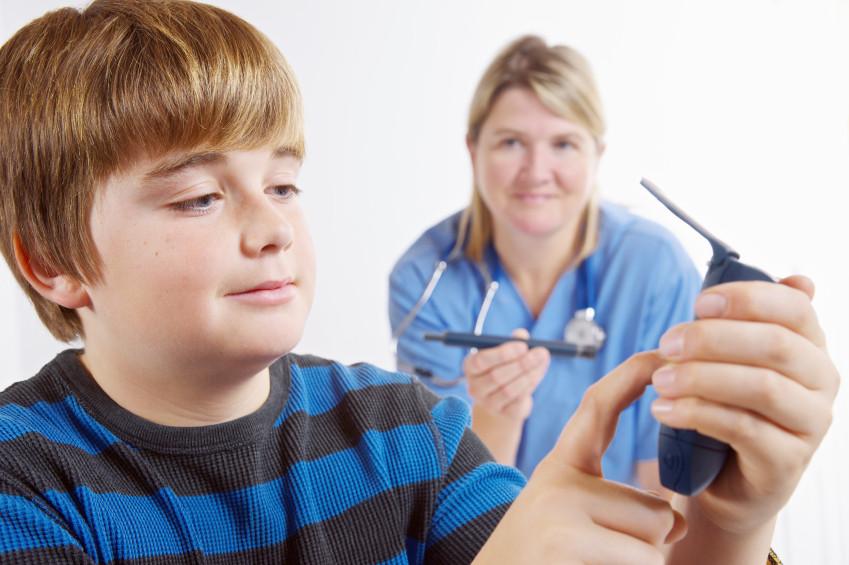
This course includes updated goals and guidelines for children living with type 1 or type 2 diabetes. This course discusses the special issues diabetes educators need to be aware of when working with children with diabetes and their families.
We discuss the clinical presentation of diabetes, goals of care, and normal growth and development through the early years through adolescence. Strategies to prevent acute and long term complications are included with an emphasis on positive coping for family and child with diabetes.
Topics include:
- Discuss the goals of care for Type 1 and Type 2 Kids with Diabetes
- State Strategies to prevent acute and chronic complications
- Discuss the importance of positive psychosocial adjustment and resources
See Full Calendar for upcoming webinars and Virtual Courses.
Can’t make it live? All paid registrants are guaranteed access to the video presentation, handouts and podcasts.
Sign up for Diabetes Blog Bytes – we post one daily Blog Byte from Monday to Friday. And of course, Tuesday is our Question of the Week. It’s Informative and FREE! Sign up below!
[yikes-mailchimp form=”1″]Accreditation: Diabetes Education Services is an approved provider by the California Board of Registered Nursing, Provider 12640, and Commission on Dietetic Registration (CDR), Provider DI002. Since these programs are approved by the CDR it satisfies the CE requirements for the CDCES regardless of your profession.*
The use of DES products does not guarantee the successful passage of the CDCES exam. CBDCE does not endorse any preparatory or review materials for the CDCES exam, except for those published by CBDCE.
Rationale of the Week – Less than 50% chose best answer | New Type 2, Action Needed?

For our June 1st Question of the Week, only 45% of respondents chose the best answer. We want to “take a closer look” at this question and figure out how to drill down to discover the best response.
Before we start though, if you don’t want any spoilers and haven’t tried the question yet, you can answer below: Answer Question
Question: JR is 43 years old with newly discovered type 2 diabetes.
According to the ADA Standards, which of the following actions need to be taken with a new type 2 diabetes diagnosis?
Answer Choices:
- Hepatitis B Vaccine.
- Screening for prostate cancer.
- Referral to podiatry.
- Antibody testing to confirm the diagnosis.
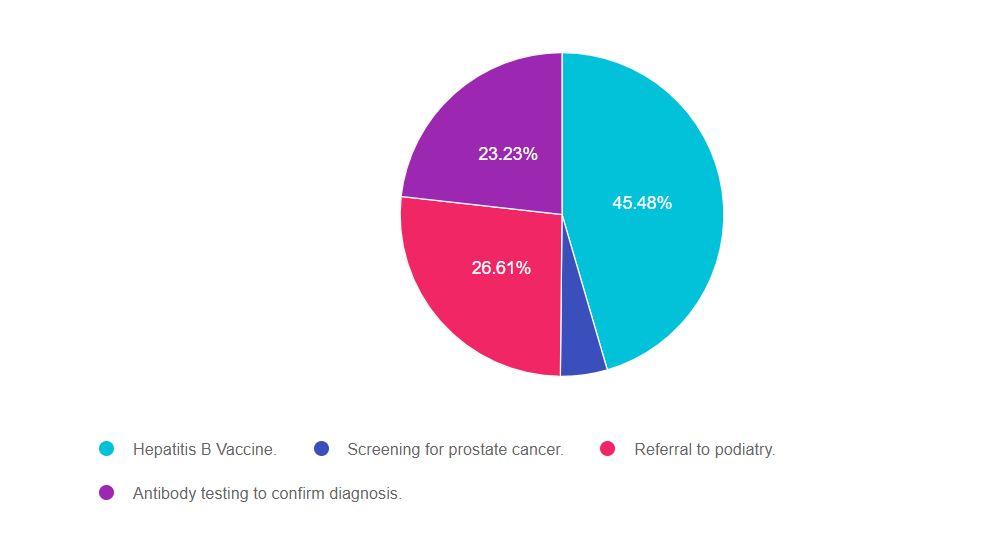
As shown above, the most common choice was option 1, the second most common answer was option 3, then option 4, and finally option 2.
Getting to the Best Answer
If you are thinking about taking the certification exam, the content of this practice test question will set you up for success. The exam will present questions that require test takers to be familiar with preventive care measures, especially suggested vaccinations based on age and risk profile.
Answers & Rationale
Answer 1 is correct, 45.48% chose this answer, “Hepatitis B Vaccine.” CONGRATS, this is the BEST answer. According to the ADA Standards of Care (see below), people with diabetes who are 18-59 years of age need protection against hepatitis infection. Since people with diabetes may share glucose checking devices and may have less hearty immune systems, they are at higher risk of getting Hepatitis B. Getting the 2-3 dose series if not previously vaccinated, offers important protection.
Answer 2 is incorrect, 4.68% of you chose this answer, “Screening for prostate cancer.” According to the ADA Standards, a new diagnosis of type 2 diabetes does not require screening for prostate cancer. In addition, according to the consensus statement on Diabetes and Cancer, men with diabetes are not at higher risk of prostate cancer. However, people with diabetes are at higher risk of pancreas, liver and breast cancer, so regular screenings for these types of cancers is indicated.
Answer 3 is incorrect, 26.61% of you chose this answer, “Referral to podiatry.” This is answer is juicy, but we don’t have enough details in the question to support referral to a podiatrist. Not everyone with new diabetes is referred to podiatry for lower extremity care. Podiatry referral is based on a careful lower extremity assessment coupled with an indication that this person is at higher risk of complications (ie ulcerations, severe calluses, risk of injury when cutting toenails, loss of protective sensation, etc).
Answer 4 is incorrect, 23.23% of you chose this answer, “Antibody testing to confirm the diagnosis.” Another juicy answer. For most people with new type 2 diabetes, the clinical presentation coupled with family history and ketone status is usually enough to determine the type of diabetes. If the question hinted that this person might have type 1 (ie history of celiac or thyroid disease, positive ketones, BMI of 21 etc) then, the provider may want to evaluate for the presence of antibodies.
We hope you appreciate this week’s rationale! Thank you so much for taking the time to answer our Question of the Week and participate in this fun learning activity!
Sign up for Diabetes Blog Bytes – we post one daily Blog Byte from Monday to Friday. And of course, Tuesday is our Question of the Week. It’s Informative and FREE! Sign up below!
[yikes-mailchimp form=”1″]Accreditation: Diabetes Education Services is an approved provider by the California Board of Registered Nursing, Provider 12640, and Commission on Dietetic Registration (CDR), Provider DI002. Since these programs are approved by the CDR it satisfies the CE requirements for the CDCES regardless of your profession.*
The use of DES products does not guarantee the successful passage of the CDCES exam. CBDCE does not endorse any preparatory or review materials for the CDCES exam, except for those published by CBDCE.








